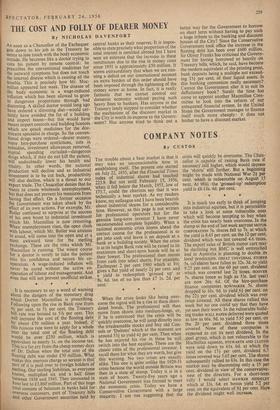THE COST AND FOLLY OF DEARER MONEY
By NICHOLAS DAVENPORT As soon as a Chancellor of the Exchequer gets down to his job in the Treasury he seems to lose touch with the body economic outside. He becomes like a doctor trying to cure his patient by remote control : he Prescribes the conventional medicines for the outward symptoms but does not touch the internal disease which is causing all the trouble. This is precisely how Mr. Mac- millan appeared last week. The disease of the body economic is a wage-induced inflation which has been allowed to grow to dangerous proportions through bad doctoring. A skilled doctor would long ago have ordered a slimming diet-would cer- tainly have avoided the fat of a building and import boom-but this would have meant import controls and building licences which are quack medicines for the doc- trinaire specialist in charge. So the conven- tional drugs were ordered-dearer money, More hire-purchase restrictions, cuts in subsidies, investment allowances removed, capital spending curtailed-dangerous drugs which, if they do not kill the patient, will undoubtedly lower his health and vitality. In other words, the national production will decline and as industrial investment is to be cut back, productivity will also decline, which is a threat to our export trade. The Chancellor denies that he Wants to create wholesale unemployment, but that does not prevent his measures from having that effect. On a former occasion the Government was taken aback by the effect of its own actions. For example, Mr. Butler confessed to surprise at the success of his own boost to industrial investment Which Mr. Macmillan is now removing. When unemployment rises, the open clash with labour, which Mr. Butler was anxious to avoid, will come into the open and at a most awkward time for the sterling exchange. These are the risks which Mr. Macmillan is running. The wisest course for a doctor is surely to take the patient into his confidence and secure his co- operation. A wage-induced inflation will never be cured without the active co- operation of labour and managements. And even that will not prevent unofficial strikes.
It is necessary to say a word of warning about the dangers of the monetary drug which Doctor Macmillan is prescribing. Following upon the rise in Bank rate from 4* per cent. to 5+ per cent. the Treasury bill rate was hoisted to 5-A- per cent. This will increase the cost of the floating debt by about £50 million a year. Indeed, if this ruinous rate were to apply for a whole Year the total cost of the floating debt would be over £250 million, which is equivalent to nearly 1s. on the income tax. This is a far cry from the cheap money days of Dr. Dalton when the total cost of the floating debt was under £50 million. What makes this onerous charge so serious is that part of it is paid over to foreign holders of sterling. Our sterling liabilities, as everyone knows, multiplied six and a half times between 1938 and 1945. They amounted in June last to £3,860 million. Part of this huge total consists of balances in banks held for overseas customers, part of Treasury bills and other Government securities held by
central banks as their reserves. It is impos- sible to state precisely what proportion of the total interest is remitted abroad but I have seen an estimate that the increase in these remittances due to the rise in money rates since 1951 is approximately £50 million. It seems extraordinary that when we are run- ning a deficit on our international account an extra burden of this order should have been imposed through the tightening of the money screw at home. In fact, it is really fantastic that we cannot control our domestic economy without paying such heavy fines to bankers. Has anyone in the Treasury lately stopped to consider whether the mechanism of the discount market in the City is worth its expense to the Govern- ment? Has anyone tried to think out a better way for the Government to borrow on short term without having to pay such a huge tribute to the banking and discount houses of the City? Since the Conservative Government took office the increase in the floating debt has been over £600 million. Sir Oliver Franks has criticised the Govern- ment for having borrowed so heavily on Treasury bills, which, he said, have become the modern equivalent of the printing press, bank deposits being a multiple not exceed- ing 33+ per cent. of their liquid assets. Is this banking convention really necessary? Cannot the Government alter it to suit its deflationary book? Surely the time has come to appoint another Macmillan Com- mittee to look into the reform of Our antequated financial system. In the United States the Government manages to finance itself much more cheaply : it does not bother to have a discount market.


































 Previous page
Previous page